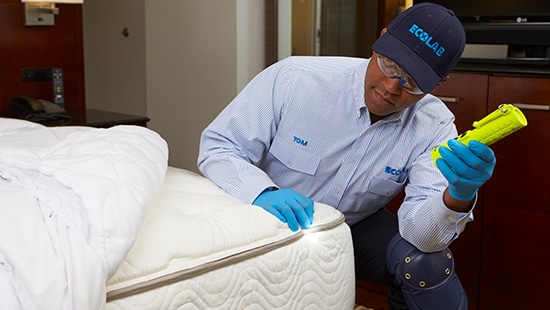Finding the Different Types of Bug Control Techniques and Their Applications
Bug control is a vital aspect of maintaining a healthy and balanced and risk-free setting, whether it be in household, industrial, or farming settings. From chemical techniques that target certain pests to organic methods that harness all-natural killers, the realm of parasite control is large and diverse.
Chemical Insect Control Strategies
Chemical insect control strategies are widely made use of in agriculture and parasite administration to successfully eliminate or control pest invasions. These methods involve making use of chemical materials, such as chemicals, herbicides, and insecticides, to remove or minimize pest populations that present a threat to plants, animals, or human health. Chemicals, as an example, target specific insects like rats, bugs, or weeds, disrupting their life cycles or triggering direct injury upon get in touch with. Herbicides are specifically made to manage unwanted plants that takes on plants for resources and nutrients. Insecticides, on the other hand, are utilized to combat insect bugs that can harm plants and transfer diseases.
While chemical bug control strategies can be highly effective in managing insect populations, they likewise elevate concerns about potential ecological and wellness risks. Improper use or overuse of chemical pesticides can bring about air pollution of air, dirt, and water, harming non-target microorganisms and creating long-lasting eco-friendly damages. Furthermore, repeated exposure to chemical deposits may pose wellness risks to farmworkers, customers, and wildlife. Hence, it is vital to adhere to security guidelines, make use of incorporated pest administration strategies, and think about alternate approaches to reduce the unfavorable effects of chemical pest control methods.
Organic Bug Control Methods
 Biological pest control approaches make use of living microorganisms to handle and minimize bug populaces in a lasting and ecologically pleasant fashion. One common technique is the release of ladybugs to deal with aphids in gardens, as ladybugs are all-natural killers of these devastating bugs.
Biological pest control approaches make use of living microorganisms to handle and minimize bug populaces in a lasting and ecologically pleasant fashion. One common technique is the release of ladybugs to deal with aphids in gardens, as ladybugs are all-natural killers of these devastating bugs.
Biological insect control approaches provide several benefits over chemical approaches. They are usually much safer for the environment, as they do not leave unsafe deposits or add to air pollution. Furthermore, these approaches are frequently a lot more targeted, affecting just the pest species without hurting beneficial pests or various other microorganisms. Biological control can be a lasting remedy, as the introduced organisms can establish lasting populations and offer recurring insect administration. Generally, biological insect control methods present a efficient and natural alternative to standard chemical therapies, advertising a balanced ecological community and much healthier environments.
Physical Pest Control Approaches
Making use of physical methods to manage bugs includes the usage of mechanical or non-chemical ways to handle and reduce pest invasions properly. One usual physical bug control technique is the setup of displays, fences, or webs to obstruct bugs from getting in certain locations.
Another physical strategy is making use of catches, such as snap catches for rats or scent catches for insects. These catches purpose to record insects without presenting any kind of threat to human beings or the environment. Additionally, physical control techniques can consist of methods like handpicking pests off plants, utilizing vacuum devices to get rid of insects, or employing heat therapies to eliminate bed bugs and various other parasites in infested areas.
Integrated Pest Monitoring Strategies
Carrying out an all natural approach to pest monitoring, Integrated Pest Monitoring (IPM) approaches aim to integrate various effective methods to stop and manage insect problems while decreasing ecological impact and making certain lasting insect control practices. IPM entails the assimilation of multiple control techniques such as biological control, cultural techniques, mechanical control, and the cautious usage of chemicals.

Additionally, IPM highlights the relevance of monitoring and analyzing pest populations to establish one of the most suitable control methods. By applying IPM right here techniques, pest control initiatives come to be extra targeted and efficient, minimizing the threats connected with excessive pesticide use and promoting long-term insect monitoring services.
Natural and Organic Bug Control Options

One popular organic pest control approach is neem oil, originated from the seeds of the neem tree, which works as a repellent and disrupts the development and growth of bugs. Diatomaceous planet, an all-natural silica-based the original source powder, is another reliable organic bug control option that works by drying out pests upon contact. By including natural and all-natural pest control options into insect monitoring strategies, individuals can properly control insects while lessening damage to the environment and promoting sustainable methods.
Verdict
To conclude, various insect control strategies such as chemical, organic, physical, incorporated parasite management, and natural options are available for properly handling parasite problems. Each approach has its very own benefits and applications relying on the sort of insect and the setting. By understanding the various kinds of parasite control techniques and their applications, people can make informed decisions on the most suitable method to control insects and safeguard their property.
Chemical insect control methods are commonly used in farming and parasite monitoring to properly get rid of or regulate pest problems - Orem Pest Control. All-natural insect control methods involve making use of organic control representatives, such as parasites or predators, to take care of bug populations. By incorporating natural and natural pest control alternatives into pest management strategies, people can efficiently control parasites while visit this site right here lessening harm to the setting and advertising sustainable practices
In verdict, various parasite control methods such as chemical, organic, physical, integrated insect management, and all-natural choices are offered for efficiently managing pest invasions. By comprehending the different kinds of insect control methods and their applications, people can make enlightened decisions on the most appropriate technique to control pests and secure their building.